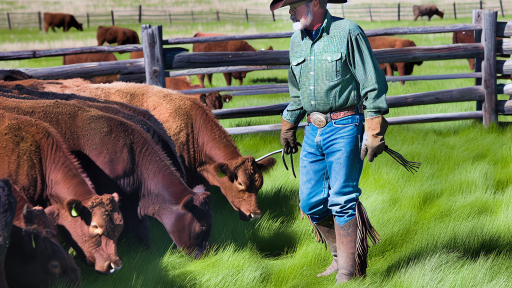Importance of Record Keeping in Beef Cattle Farming
Record keeping plays a vital role in beef cattle farming.
It enables farmers to track animal health and performance effectively.
Moreover, accurate records facilitate informed breeding decisions.
Farmers can identify profitable traits and make data-driven choices.
This practice also aids in disease management and prevention.
Consequently, it reduces the risk of infectious diseases spreading.
Monitoring feed efficiency becomes easier with meticulous records.
Farmers can optimize resource allocation based on feeding patterns.
Additionally, effective record keeping helps with compliance issues.
It ensures adherence to regulations and quality assurance standards.
Furthermore, detailed records support financial management.
Farmers can analyze expenses and revenues with ease.
This analysis assists in making strategic decisions for growth.
Efficient record keeping enhances overall farm productivity.
Therefore, it is essential for successful beef cattle operations.
Transform Your Agribusiness
Unlock your farm's potential with expert advice tailored to your needs. Get actionable steps that drive real results.
Get StartedTypes of Records to Maintain
Health Records
Health records are crucial for beef cattle farms.
These records track vaccinations and treatments.
They help identify patterns in health issues.
Moreover, keeping detailed notes on each animal supports targeted healthcare.
Utilizing a digital system can streamline this process.
Farmers can benefit from reminders for vaccinations and health checks.
Consequently, accurate health data supports better management decisions.
Production Records
Production records detail growth and productivity metrics.
Farmers should track weight gain and feed efficiency regularly.
Additionally, monitoring breeding dates aids in optimizing calving schedules.
These records allow farmers to assess herd performance over time.
Furthermore, production data can reveal trends in feed requirements.
Ultimately, this information guides resource allocation on the farm.
Financial Records
Financial records are essential for the success of beef cattle farms.
These records should include income and expenses for accurate analysis.
Farmers must track costs associated with feed, labor, and veterinary services.
Understanding financial performance allows for improved budgeting.
Additionally, maintaining good financial records supports access to loans.
By reviewing financial trends, farmers can make informed business decisions.
Strong financial documentation underpins a successful operation.
Record Keeping Tools and Technologies
Understanding the Importance of Digital Solutions
Digital tools enhance efficiency in record keeping.
They reduce the chances of human error.
Additionally, they provide better accessibility to data.
Popular Software Options
There are numerous software programs available for beef cattle farms.
Showcase Your Farming Business
Publish your professional farming services profile on our blog for a one-time fee of $200 and reach a dedicated audience of farmers and agribusiness owners.
Publish Your ProfileThese programs cater to specific record keeping needs.
Examples include CattleMax and RanchManager.
Such platforms offer features like herd management and financial tracking.
Mobile Applications for On-the-Go Tracking
Mobile apps make record keeping convenient for farmers.
Farmers can access data anytime, anywhere.
Apps like FarmLogs allow for easy note-taking and tracking.
They also provide reminders for important tasks.
Integrating Cloud-Based Solutions
Cloud services allow for seamless data storage and sharing.
This technology enables multiple users to access information simultaneously.
Popular options include Google Drive and Dropbox.
Cloud storage ensures data remains secure and backed up.
Choosing the Right Tool for Your Farm
Selecting the right record keeping tool requires careful consideration.
First, assess your farm’s specific needs and goals.
Secondly, evaluate user-friendliness and support options available.
Finally, consider the cost of each solution.
Training Staff on New Systems
Training staff is essential when introducing new technology.
Ensure everyone understands how to use the chosen tools effectively.
Regular training sessions can foster proficiency in record keeping.
Furthermore, create a culture of continuous learning.
Explore Further: Biosecurity Measures for Sheep Farms
Best Practices for Data Entry and Accuracy
Establish a Data Management System
First, select a reliable data management system for your farm.
Consider options like farm management software or spreadsheets.
Ensure the system allows for easy data entry and retrieval.
Regularly update the system to reflect real-time changes.
Train Your Staff Properly
Invest time in training your staff on data entry procedures.
Provide clear instructions to minimize errors during data entry.
Encourage the team to ask questions if unsure about the process.
Regularly review training materials to keep everyone informed.
Implement Regular Audits
Conduct regular audits of your data entries for accuracy.
Identify common errors and address the root causes promptly.
Schedule audits quarterly to ensure ongoing compliance.
Use audit findings to improve training and processes.
Utilize Technology Effectively
Leverage mobile data entry tools for on-the-go updates.
Consider using barcode scanners for tracking livestock.
Integrate your data management system with other farm technologies.
This integration improves overall accuracy and efficiency.
Establish Clear Data Entry Protocols
Create detailed protocols for data entry procedures.
Ensure all staff members understand these protocols thoroughly.
Standardize data formats to maintain consistency across entries.
Consider developing checklists to guide your team.
Showcase Your Farming Business
Publish your professional farming services profile on our blog for a one-time fee of $200 and reach a dedicated audience of farmers and agribusiness owners.
Publish Your ProfileEncourage Timely Data Input
Encourage staff to enter data immediately after events occur.
Set aside dedicated time each day for data entry tasks.
Remind team members that timely entry improves accuracy.
Regular updates help you manage your farm more effectively.
You Might Also Like: Essential Sheep Breeds for Farming Success
Utilizing Records for Breeding Decisions and Genetic Management
The Importance of Accurate Record Keeping
Accurate record keeping is crucial in beef cattle farming.
It enables farmers to track ancestry and lineage effectively.
Consequently, this practice supports informed breeding decisions.
Implementing Breeding Records
Breeding records should contain essential information.
Include details such as mating dates and bull selection.
Additionally, document calving dates and offspring performance.
Using Data for Genetic Management
Genetic management relies heavily on comprehensive data.
Farmers can analyze genetic traits through available records.
These insights lead to improved herd quality and productivity.
Tracking Performance Metrics
Monitoring performance metrics is vital for effective management.
Focus on growth rates and reproductive performance.
Additionally, assess feed efficiency and overall health.
Evaluating and Adjusting Breeding Strategies
Regular evaluations of breeding strategies enhance outcomes.
Utilize performance records to identify successful traits.
Adjust breeding tactics based on available genetic data.
Implementing Technology in Record Keeping
Technology significantly improves record-keeping practices.
Employ software solutions designed for livestock management.
These tools simplify data entry and analysis for farmers.
Engaging with Genetic Improvement Programs
Participation in genetic improvement programs offers multiple benefits.
Farmers gain access to advanced breeding practices and techniques.
Additionally, these programs enhance the overall quality of cattle.
Discover More: Using DNA Testing in Livestock Breeding Programs

Analyzing Financial Records for Profitability and Cost Control
The Importance of Financial Records
Financial records provide crucial insight into farm performance.
They help farmers understand income and expenses effectively.
Moreover, accurate records assist in strategic decision-making.
Organizations can identify trends and anticipate future needs.
Types of Financial Records to Maintain
Farmers should track various types of financial records.
These include income statements, balance sheets, and cash flow statements.
Income statements reveal revenue generated from livestock sales.
Balance sheets provide valuable information about the farm’s assets and liabilities.
Cash flow statements help monitor the inflow and outflow of cash.
Monitoring Cost of Production
Understanding the cost of production is vital for profitability.
Farmers should categorize their costs into fixed and variable expenses.
Fixed costs remain constant regardless of production levels.
Variable costs fluctuate based on herd size and feed prices.
Showcase Your Farming Business
Publish your professional farming services profile on our blog for a one-time fee of $200 and reach a dedicated audience of farmers and agribusiness owners.
Publish Your ProfileEffectively tracking these costs helps farmers control their spending.
Utilizing Financial Software
Many farmers benefit from using financial management software.
This technology simplifies record-keeping and data analysis.
Software can automate calculations and generate reports quickly.
Additionally, it aids in tracking multiple years of financial history.
Setting Benchmarks for Performance Evaluation
Establishing benchmarks is essential for evaluating farm performance.
Farmers should compare their financial metrics against industry averages.
Regularly reviewing these benchmarks highlights areas for improvement.
Adjusting practices in response to performance metrics increases profitability.
Incorporating Data for Future Planning
Data from financial records is invaluable for future planning.
Farmers can forecast budgets based on past performance.
Planning for upcoming expenses helps prevent cash flow issues.
Moreover, informed planning facilitates sustainable farm growth.
Uncover the Details: Sustainable Practices In Livestock Housing
Compliance and Regulatory Requirements for Record Keeping
Understanding Necessary Regulations
Each beef cattle farm must comply with federal and state regulations.
Regulations ensure the safety and quality of meat products.
Farmers should stay informed about changes in laws.
Regular updates from the USDA can help keep farmers compliant.
Essential Records to Maintain
Farmers need to document all cattle movements.
Keep records of health treatments administered to each animal.
Document any feed purchases and usage comprehensively.
Additionally, maintain records of breeding and calving activities.
Impact of Non-Compliance
Non-compliance can lead to significant fines or penalties.
In some cases, farms may face suspension of operations.
Moreover, failing to comply can damage a farm’s reputation.
Consumers today prefer farms that prioritize transparency.
Utilizing Technology for Record Keeping
Many farms now use software tailored for livestock management.
Such tools simplify the process of maintaining detailed records.
Additionally, mobile apps help farmers access records anytime.
This technology enhances accuracy and efficiency in record keeping.
Best Practices for Effective Record Keeping
Establish a routine for updating records consistently.
Set reminders to ensure timely documentation of activities.
Regularly review records for accuracy and completeness.
Train staff on the importance of quality record keeping.
Training Staff and Developing a Record Keeping Culture
The Importance of Training
Training staff on record keeping is essential for beef cattle farms.
Well-trained employees increase overall efficiency.
Additionally, training ensures accurate data collection.
To start, create a robust training program.
Include modules on data entry, retrieval, and analysis.
Moreover, involve hands-on practice to reinforce learning.
Showcase Your Farming Business
Publish your professional farming services profile on our blog for a one-time fee of $200 and reach a dedicated audience of farmers and agribusiness owners.
Publish Your ProfileImplementing Best Practices
Encourage staff to adopt best practices in record keeping.
First, establish standardized procedures for documentation.
Secondly, emphasize the importance of consistency.
Regularly review these practices to ensure adherence.
Furthermore, provide feedback to improve the process.
Cultivating a Record Keeping Culture
Creating a culture around record keeping positively impacts productivity.
Start by discussing the benefits of accurate records.
For instance, improved livestock management depends on reliable data.
Recognize employees who excel in maintaining accurate records.
Additionally, celebrate milestones related to data management.
Ongoing Education and Support
Provide ongoing education to keep staff informed.
Host workshops focusing on new technologies and practices.
Encourage collaboration among team members for knowledge sharing.
Moreover, create a dialogue to address challenges faced in record keeping.
Ultimately, continuous support fosters a lasting commitment to best practices.
Additional Resources
Cows and Climate Change | UC Davis
Beef Cattle Performance Record Keeping – Alabama Cooperative …




